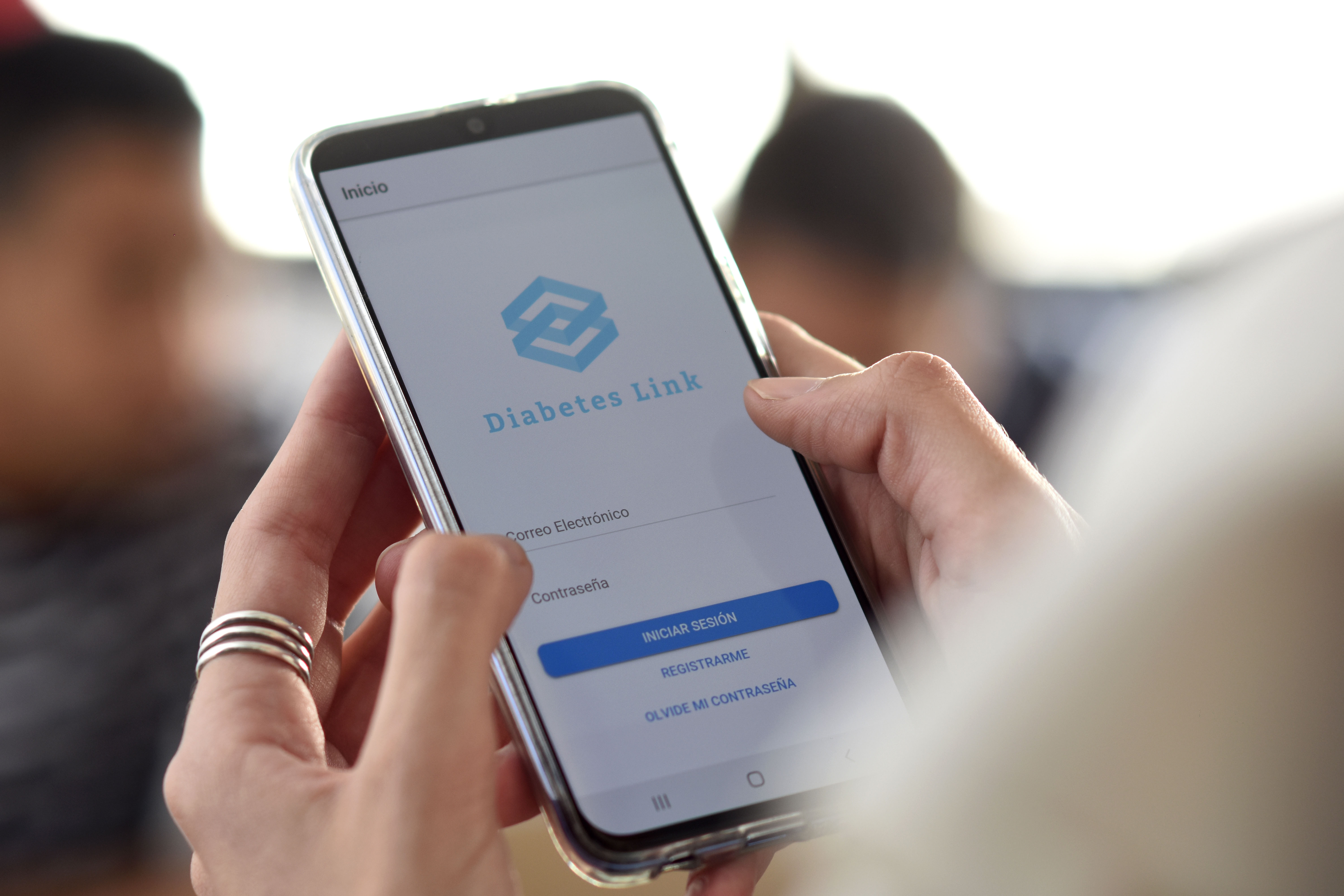Diabetes Link: Technological innovation at the service of health
DOI:
https://doi.org/10.24215/26838559e28Keywords:
diabetes;, glycemia, insulin, mHealth, health informatics, mobile app, websiteAbstract
Diabetes Mellitus (DM) is a chronic disease characterized by an increase in blood glucose (sugar) above normal levels and it appears when the endocrine pancreas is not able to produce the corresponding regulatory hormone (insulin). Nowadays, DM affects 8.5% of the world’s population and the situation gets worst in Argentina since 12.7% of its adult people is affected. Even though no cure for it has been found, an adequate control prevents the development of complications that harm the patients’ quality of life and increase the treatment costs. This control requires an active participation of the patient in the monitoring and treatment of the illness. In addition, depending on patient and disease severity, multiple clinical and metabolic parameters should be monitored, such as body weight, blood glucose, blood pressure, the amount of ingested carbohydrates, and physical activity performed. All these parameters have an impact in achieving treatment goals.
Diabetes Link is a comprehensive platform for control and monitoring people with DM; it combines a mobile application and a web portal. Diabetes Link allows recording various parameters relevant for the treatment and calculating multiple statistical charts. In addition, it allows connecting with other users (supervisors) so they can monitor the controls.
To determine the feasibility and potential of the proposal, physicians, educators and clinical researchers were interviewed. This development phase was complemented with a state-of-the-art study of mobile applications oriented to diabetes. After this stage, a mobile application was designed and developed (available at both Google PlayStore and Apple iOS Store) combined with a web portal (available at diabeteslink.info.unlp.edu.ar).
Downloads
References
Arnhold, M., Quade, M. y Kirch, W. (2014). Mobile applications for diabetics: a systematic review and expert-based usability evaluation considering the special requirements of diabetes patients age 50 years or older. Journal of medical Internet research, 16(4), e104. https://doi.org/10.2196/jmir.2968
BAE Negocios (2018). Argentina es el país de la región que tiene más smartphones por habitante. https://www.baenegocios.com/negocios/Argentina-es-elpais-de-la-region-que-tiene-mas-smartphones-por-habitante-20180129-0022.html
Blenner, S. R., Köllmer, M., Rouse, A. J., Daneshvar, N., Williams, C. y Andrews, L. B. (2016). Privacy Policies of Android Diabetes Apps and Sharing of Health Information. JAMA, 315(10), 1051–1052. https://doi.org/10.1001/jama.2015.19426
Delia, L., Galdamez, N., Thomas, P., Corbalan, L. y Pesado, P. (13-15 de mayo de 2015). Multi-platform mobile application development analysis. IEEE 9th International Conference on Research Challenges in Information Science (RCIS). Atenas, Grecia. http://dx.doi.org/10.1109/RCIS.2015.7128878
Elgart, J. F., Asteazarán, S., De La Fuente, J. L., Camillucci, C., Brown, J. B. y Gagliardino, J. J. (2014). Direct and indirect costs associated to type 2 diabetes and its complications measured in a social security institution of Argentina. International journal of public health, 59(5), 851–857. https://doi.org/10.1007/s00038-014-0604-4
Erbino, P. y Pujol, J. (2019). Diabetes Link: Aplicación Móvil Multiplataforma para Control de Diabetes. [Tesina de Licenciatura en Sistemas, Facultad de Informática, Universidad Nacional de La Plata]. http://sedici.unlp.edu.ar/handle/10915/80543
Gaede, P., Vedel, P., Larsen, N., Jensen, G. V., Parving, H. H. y Pedersen, O. (2003). Multifactorial intervention and cardiovascular disease in patients with type 2 diabetes. The New England journal of medicine, 348(5), 383–393. https://doi.org/10.1056/NEJMoa021778
Gagliardino, J.J., Assad, D., Gagliardino, G.G., Kronsbein, P., Lahera, E., Mercuri, N., Rizzuti, L. y Zufriategui, Z. (2010). Cómo tratar mi diabetes. Aventis Pharma.
Gagliardino, J.J., Lapertosa, S., Pfirter, G., Villagra, M., Caporale, J.E, Gonzalez, C.D., Elgart, J., González, L., Cernadas, C., Rucci, E., y Clark Jr, C., en representación del grupo PRODIACOR (2013). Clinical, metabolic and psychological outcomes and treatment costs of a prospective randomized trial based on different educational strategies to improve diabetes care (PRODIACOR). Diabetic Medicine, 13, 1102-1111. https://doi.org/10.1111/dme.12230
Huang, Z., Soljak, M., Boehm, B. O. y Car, J. (2018). Clinical relevance of smartphone apps for diabetes management: A global overview. Diabetes/metabolism research and reviews, 34(4), e2990. https://doi.org/10.1002/dmrr.2990
Instituto Nacional de Estadística y Censos (INDEC) (2019). 4° Encuesta Nacional de Factores de Riesgo. Resultados preliminares. Secretaría de Gobierno de Salud. https://sitioanterior.indec.gob.ar/ftp/cuadros/publicaciones/enfr_2018_resultados_preliminares.pdf
Morsanutto, A., Berto, P., Lopatriello, S., Gelisio, R., Voinovich, D., Cippo, P. P. y Mantovani, L. G. (2006). Major complications have an impact on total annual medical cost of diabetes: results of a database analysis. Journal of diabetes and its complications, 20(3), 163–169. https://doi.org/10.1016/j.jdiacomp.2005.06.011
Organización Mundial de la Salud (2014). Be he@lthy, be mobile. https://www.who.int/nmh/publications/be-healthy-be-mobile/en/
Organización Mundial de la Salud (2018). Diabetes. https://www.who.int/es/news-room/fact-sheets/detail/diabetes
Williams, R., Van Gaal, L. y Lucioni, C. (2002). Assessing the impact of complications on the costs of Type II diabetes. Diabetologia, 45, S13-17. https://doi.org/10.1007/s00125-002-0859-9

Downloads
Published
How to Cite
Issue
Section
License
Los autores que publiquen en esta revista aceptan las siguientes condiciones:
La aceptación del manuscrito por parte de la revista implica la no presentación simultánea a otras revistas u órganos editoriales y la cesión no exclusiva de los derechos patrimoniales de los autores en favor del editor, quien permite la reutilización, luego de su edición (postprint), bajo licencia Creative Commons 4.0 (https://creativecommons.org/licenses/by-nc/4.0/deed.es). Usted es libre de:
1) Compartir, copiar y redistribuir el material en cualquier medio o formato.
2) Adaptar, remezclar, transformar y crear a partir del material, bajo los siguientes términos: 1) Atribución — Usted debe darle crédito a esta obra de manera adecuada, proporcionando un enlace a la licencia, e indicando si se han realizado cambios. Puede hacerlo en cualquier forma razonable, pero no de forma tal que sugiera que usted o su uso tienen el apoyo del licenciante. 2) Uso No Comercial — Usted no puede hacer uso del material publicado con fines comerciales.
Los autores pueden realizar otros acuerdos contractuales independientes y adicionales para la distribución no exclusiva de la versión del artículo publicado en esta revista (p. ej., incluirlo en un repositorio institucional o publicarlo en un libro) siempre que indiquen claramente que el trabajo se publicó por primera vez en esta revista.
La responsabilidad de cada trabajo publicado en cuanto a su contenido recae exclusivamente en los autores del mismo, deslindando a los editores de cualquier responsabilidad legal.

















